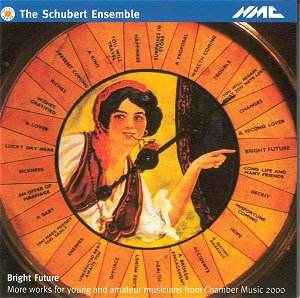In 2002 I reviewed another NMC release, Spectrum
3, the third disc in a series devoted to piano music for young
and amateur performers by composers with established or growing international
reputations.
In the same vein, Bright Future is the follow
up release to A White Room, a similar simultaneous project initiated
by The Schubert Ensemble in 1998, inviting composers to write music
for piano and single strings, the only premise being that the composers
are true to their own stylistic language and that the pieces are capable
of being played by young and amateur musicians.
Both projects have been unmitigated and admirable successes
with fifty pieces having been written for The Schubert Ensemble within
the last five years. Not surprisingly the pieces presented on Bright
Future encompass a fairly broad stylistic range, albeit avoiding
the densest atonality and like the Spectrum project, give an interesting
and at times entertaining overview in miniature, effectively a series
of musical snapshots, of the diversity on offer in the current contemporary
music scene.
As you would expect a handful of pieces stand out from
the crowd for either their imaginative inventive flair or ear-catching
scoring. Joe Cutler is one of our most promising young talents
and his entertaining Jiggadybox, a tongue in cheek invention
by the "eighteenth century Swiss inventor, gambler and philosopher
Rudolf Von Stengl", progresses from a static opening to a state
of overheat as the musical contraption grows ever more wild and energetic.
Rachel Stottís fleeting Serendipity and Household Objects,
takes as its starting point the sounds obtainable from everyday household
objects, a comb, cutlery, empty yoghurt pot etc. and transforms them
into instrumental sound, setting a wide range of string effects against
an appealing, vaguely medieval sounding melody on the piano. Judith
Binghamís characteristically atmospheric The Mystery of Boranup,
features an uncannily realistic string impersonation of the didgeridoo
in her evocative picture of an ancient Australian forest whilst the
first movement of Victor Steinhardtís Piano Quartet is
one of the more demanding pieces on the performers, broadly triadic,
melodically and rhythmically attractive, with a hint of Bartók
thrown in for good measure. Graham Fitkinís contribution, MacGuffin,
is somewhat more restrained than one might expect from this composer
but offers much to enjoy in its familiar rhythmic patterns and straightforward
melodic appeal. The circling, modally conceived harmonies of Edward
Dudley Hughesís Secret Sky paint an effective tone poem in
miniature, in sharp contrast to Michael Finnissyís Bright
Future Ignoring Dark Past that immediately follows it, one of the
tougher contributions in terms of language and a typically clever juxtaposition
of a late nineteenth century song, "What shocking hard times"
and two Methodist hymns, an ironic musical comment on the current and
future state of British education. Cecilia McDowall was the featured
composer at the 2002 Presteigne Festival and her unashamedly witty A
Draught of Fishes (her fishes are clearly close relations of Schubertís
trout!) is both gently entertaining and attractive on the ear.
Nicola Lefanuís Miniature and Canon,
Martin Butlerís Spring Rounds, Peter Sculthorpeís
From the River and Adam Gorbís Bittersweet are
all well crafted, if not the most attention grabbing works on the disc
and although there are a few slight disappointments elsewhere the seventeen
miniatures generally manage to sustain musical interest pretty well
through the fifty six minutes running time of the recording.
Indeed, in different ways all of the pieces on this
disc have something to offer but what should matter most is that the
"something" includes a sense of fun and reward for the young
and amateur musicians who are hopefully likely to be performing them.
These committed performances by The Schubert Ensemble should stand as
a useful example to younger players in particular, of what can be achieved.
Christopher Thomas

